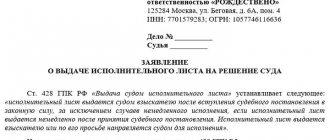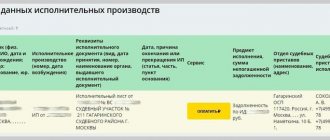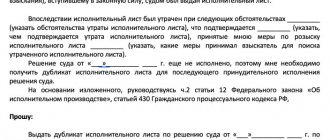The natural result of any case that is referred to the court is the announcement of a decision by the judge. As soon as it is formalized, as required by law, and receives legal force, you can begin to implement it. How to obtain a writ of execution based on a court decision in a civil case in 2021?
The algorithm of actions is as follows: wait for the court decision to enter into force, write an application for the issuance of a writ of execution, receive the document in hand and submit it to the civil service, whose employees will begin enforcement.
Why do you need a writ of execution?
A defendant who has lost a case does not always strive to fulfill the obligations imposed on him by the court as quickly as possible. The dispute has been resolved, a decision on it, and it is mandatory for both organizations and citizens. But for various reasons there is no real implementation.
This is precisely what the enforcement service, the FSSP, is intended for. A solution alone is not enough; another document is needed. Based on it, as well as the claimant’s application, the bailiff will open a case and begin to perform his official duties. They are to ensure proper execution.
Which court issues IL after an appeal?
These documents are issued by civil courts and arbitration courts. Moreover, the codes regulating the activities of these courts differ in the description of the procedure for their issuance after an appeal, cassation or supervision.
The procedure is described in more detail in Part 2. Art.
319 of the Arbitration Procedure Code of the Russian Federation, which states that after review by higher authorities, it is issued by the court that conducted the trial of the first instance.
In other words, the AI that has considered the complaint does not bother its clerks with routine work. He sends the verdict to the court whose decision was appealed, and the latter, on the basis of the received document, issues the papers to the claimant.
In paragraph 4 of Art. 428 of the Code of Civil Procedure of the Russian Federation there is a clause stating that a writ of execution issued before entering into legal force is considered void and is revoked if a revision by a higher authority follows. However, this does not apply to those issued on the basis of decisions that enter into force immediately.
Where to get it?
The claimant who filed the appeal can receive it in the office where he filed the complaint, after receiving the verdict of the higher court. If the claimant already has such a document in his hands, and the appeal cancels or changes the decision on which it was issued, then the originally issued one is recalled. In return, another one is issued.
In what cases is it necessary?
If the court applied the claim procedure, then the logical conclusion of the process will be a decision. There is another judicial procedure, it is called a writ. Its distinctive feature is that the application is considered within several days. In this case, participants in the process are not invited to participate in the meeting.
Based on the results of the consideration, the magistrate (it is within his competence to issue court orders) will draw up the necessary document, and then send it to interested parties.
The court order immediately acquires the force of an executive document. Accordingly, there is no need to go with him to receive the document in question. It is precisely one order that should be submitted to the FSSP.
What should I do to receive it?
Even if the judge announced his decision and formalized it in writing, it does not immediately enter into force. Sometimes you have to wait quite a long time for the reason that the losing party did not accept defeat and began to challenge the judicial act. If so, then the appeal stage will begin.
A certain period of time is allotted for it, equal to 30 days. If there is no complaint, then after this period the decision acquires legal force. This means that it’s time to go to the civil affairs office and get a collection sheet there.
What to do if a complaint is filed?
Within the above period, a citizen or organization, if they have lost the case, can file a complaint. If you miss it, the submitted complaint will not be accepted by a higher court. If the other party wants to restore the deadline, then it will have to submit a written request along with the complaint.
The party that won the case will be asked by the court to submit its objections to the complaint. It is not necessary to do this; the law does not impose such an obligation on the participant in the process.
But if there is a desire to object to the arguments set out in the complaint, it makes sense to do so. There are no special requirements for the preparation of such a document. This means that it is compiled in any form. It is enough to familiarize yourself with the appeal and indicate which arguments of the opposing party should not be taken into account by the court.
The higher court has two options:
- Refuse the applicant and leave everything in effect
- Recognize the complaint as justified, cancel the decision and make a new one.
The verdict of the appellate court is formed in the form of a ruling, and it immediately becomes binding. If the initial decision here stands, or, as lawyers say, “is overpowered,” then you can receive the long-awaited document.
How to obtain a writ of execution based on a court decision in a civil case
The final completion of the judicial stage makes it possible to obtain the required paper. It is issued by the judicial authority that initially considered the civil case. This is where you need to go.
The office will ask you to fill out an application. It can be written by hand right there in the court office. It looks something like this:
The application must indicate:
- Name of the court that heard the case
- Data of the parties involved in the process
- An indication that the defendant refuses to comply with the decision voluntarily
- Please issue an executive document.
Within a few days, the requested document can be received in your hands. The law does not clearly define the time frame when a request for extradition must be executed. A few days is common practice. If the case is clearly dragging on, then it is advisable to write a complaint to the chairman of the district court. The Supreme Court, considering a dispute over the issuance of a document, indicated that the time frame for providing it to the applicant must be reasonable.
It is advisable to immediately check whether all the data is presented correctly; in particular, you should pay attention to:
- personal data of the plaintiff and defendant (full name, place of birth and residence, residential address).
- compliance of the information in the writ of execution with the court decision (for example, case number, dates, amount of the amount collected)
- availability of mandatory details (court seal, judge’s signature)
Errors and inaccuracies may adversely affect the further execution of a judicial act. If any errors are noticed, you need to report this to a court clerk. To hand over the document, the applicant must sign the registration documents.
Suspend execution of a court decision
23.04.2018
The most common question from clients in an arbitration case, when a decision is not made in their favor: How can one suspend or delay the execution of a court decision and a writ of execution issued by the court?
The Arbitration Procedural Code provides for a number of possibilities, which also have a 100% guarantee of suspension. It is necessary to distinguish between the methods that are used in practice depending on the order in which the case was considered in the court of first instance and what instance of the arbitration court it is - first, appellate or cassation.
First instance
Depending on the order in which the case was considered in the court of first instance, further actions depend. If a decision has been made, then legal instruments such as deferment or installment plan are applied. If a court order was issued, then the actions will be simpler.
Order proceedings
In accordance with Part 3 of Art. 229.5 of the Arbitration Procedure Code of the Russian Federation, within 10 days from the date of receipt of a copy of the court order, the debtor has the right to file objections to the arbitration court regarding its issuance. The court order will be canceled, and the claimant will be explained the right to apply to the court in a lawsuit or administrative procedure.
Consideration of the case in the usual or simplified manner
When considering a case in the usual manner (during court hearings) and in a simplified manner (without calling the parties), it is possible to defer the execution of a court decision only after its entry by filing an application for an installment plan or deferment of the execution of the court decision (Article 324 of the Arbitration Procedure Code of the Russian Federation).
The conditions for satisfying such an application are:
- non-execution of the court decision at the time of filing such an application;
- the defendant (debtor) does not have the opportunity to execute the court decision at the moment;
- there are reasons to believe that after granting a deferment or installment plan, the court decision will be executed.
Let's return to the actions that can be taken if the court decision has not yet entered into legal force.
Appeal
The easiest way is to file an appeal against the court decision before it enters into legal force. The very fact of filing a complaint makes it impossible to enforce the court decision. This rule does not apply if the case was considered through summary proceedings.
With a simplified procedure for considering cases in accordance with Chapter 29 of the Arbitration Procedure Code, the court decision is subject to immediate execution and enters into legal force after fifteen days from the date of its adoption (Part 3 of Article 229 of the Arbitration Procedure Code of the Russian Federation). This means that the plaintiff can receive a writ of execution after the announcement of the operative part of the decision and begin enforcement.
In this case, it is necessary to immediately file an appeal, even if there is no court decision with a reasoning part. Simultaneously with filing an appeal, it is necessary to file a petition to suspend the execution of a judicial act (Article 265.1 of the Arbitration Procedure Code of the Russian Federation). At the same time, 100% of the suspension guarantees will be the deposit of an amount equal to the amount of the recovery on the deposit of the arbitration court. After the consideration of the appeal is completed, it will be returned by the court to the applicant of the complaint. In the absence of depositing money, it is necessary to justify the impossibility of reversing the execution of the court or the difficulty of executing such a reversal when the judicial act of the first instance is cancelled.
Under the general procedure for consideration, it is also possible, when challenging a court decision, to file a motion to suspend execution. At the same time, the Arbitration Procedural Code contains conditions under which the appeal must be left without progress - lack of evidence of payment of the state fee, or sending a copy of the complaint to the party in the case.
Cassation
After the appellate authority adopts the decision, it comes into force immediately and the plaintiff can receive a writ of execution for presentation to the bailiff service or the debtor's bank.
Here there is also a solution for deferring the execution of a court decision.
When filing a cassation appeal, it is possible to file a petition to suspend the execution of judicial acts of the first and appellate instances (Article 283 of the Arbitration Procedure Code of the Russian Federation). Failure to attach evidence of payment of the state fee or sending a copy of the complaint to the parties to the case will not resolve the issue of suspension.
In arbitration practice, the most difficult issue is the suspension of execution of judicial acts at the stage of cassation appeal. As in the case of an appeal, a 100% guarantee of suspension will be the deposit of an amount commensurate with the amount collected by the court decision.
Another way to suspend the execution of judicial acts in the cassation instance is to justify the impossibility or difficulty of reversing the execution of judicial acts. These include information about the upcoming liquidation of the claimant, the sale of property and assets, assignment of the right of claim, the availability of information about the cancellation of the assignment of the right of claim, if the claim was based on such in the court of first instance.
Lawyer Denis Shashkin has extensive experience (over 16 years) of effectively suspending and challenging court decisions in regional appellate and cassation courts and the Supreme Court of the Russian Federation. Leave a request to suspend and/or challenge a court decision in the form or immediately call the phone numbers listed below, and we will definitely help you.
Lawyer Denis Shashkin
How to present a document to the bailiff?
Everyone knows that you need to take the document to the bailiff department. However, you should know that the case can only be opened at the debtor’s place of residence. As a rule, this place is determined based on the registration data of the debtor citizen.
One sheet is not enough. The law obliges the claimant to submit a statement along with this document. There are also no requirements for its preparation. You just need to indicate:
- sheet details,
- what court released him
- bank details for money transfers
- a request to the bailiff to initiate a case
Within three days of such an application being received, it will be transferred to the bailiff for work. The bailiff, having examined the submitted documentation, must again decide within three days whether to initiate a case or refuse.
If everything is in order with the documents, the deadline for presentation has not expired, then a positive decision will definitely be made. It takes the form of a resolution. The document itself goes into the case, and its copies are sent to the debtor and the person who demands execution of the court decision.
Presentation to the bailiffs
If the sheet was immediately transferred to the FSSP, the bailiffs initiate proceedings.
A copy of the decision is sent to the applicant. If a citizen himself received the document, he can:
- send it to the territorial branch of the FSSP;
- transfer it to the FSSP Office for the region;
- send it to the place of work (if the collection amount is up to 100,000 rubles or the appointment of periodic payments);
- transfer to the bank if there is information about the existence of accounts with the person obligated to transfer contributions.
Attention! There is no need to hand over the sheet to the debtor. If he is ready to immediately fulfill the requirement, you can draw up a receipt.
A case is initiated in the FSSP on the basis of a submitted document and application. Within 3 days, the bailiff issues a resolution, which is sent to both parties.
What deadlines must be met?
There is a general deadline for presenting documents to the bailiff. It is three years. Slightly different requirements are established for documents on the collection of regular payments. A typical example is a court order or decision to collect money for child support.
Holders of the writ of execution do not need to comply with any three-year period. They have the right to submit documents to the FSSP at any time until the child reaches full adulthood. And even when he becomes such, he is given three more years to file for collection of payments.
It happens that claimants miss deadlines, as a result of which the writ of execution loses its force. Most often this happens for some very good reason. If she is truly respectful, then you can ask the court to restore the terms. The request must be presented in the form of an appropriate written petition.
Receiving a writ of execution
Sometimes the claimant himself loses the papers, and sometimes the bailiff also loses them. But in any case, the court will decide this problem. It is not forbidden to go to court and submit a written request to obtain a duplicate. The application must indicate the following:
- What civil case was considered by the court?
- When was the writ of execution received?
- Due to what circumstances it was lost.
There is a time limit for filing such a request with the court. It is equal to the deadline for submitting the writ of execution for collection. As stated in the previous section, it is 3 years if we are talking about a court decision.
It should be borne in mind that sometimes a bailiff can apply to the court with such a request if the loss of the writ of execution was due to his fault. In this case, there is no time limit. The court is obliged to consider the request within 10 days.
How to write and submit a petition for the issuance of a writ of execution to the arbitration court
Why do you need an application?
Expert opinion
Korolev Stanislav Vitalievich
Lawyer with 10 years of experience. Specialization: family law. More than 3 years of experience in defense in court.
by a court decision, it is sent to the FSSP only for the collection of debts to the budget (these are all kinds of arrears in taxes, payments to social funds, fines. In other cases, in order to receive a sheet, the collector must.
This is due to the fact that the presentation of IL to the debtor can be carried out in several different ways, which the court may not know about in advance. There are two options:
. After this, the claimant can decide the fate of the issued IL as follows:
- take measures to independently recover;
- send to the debtor if the plaintiff is confident of voluntary performance;
- transfer to the bank where the defendant’s current account is opened;
- send to the accounting department of the enterprise if the defendant (debtor) is an individual;
- present to the regional branch of the Treasury of the Russian Federation;
- send to the FSSP if it is difficult to independently search for and sell property that can be sold to pay off the debt.
The second option is to indicate in the application a request to send it to the bailiffs for enforcement.










